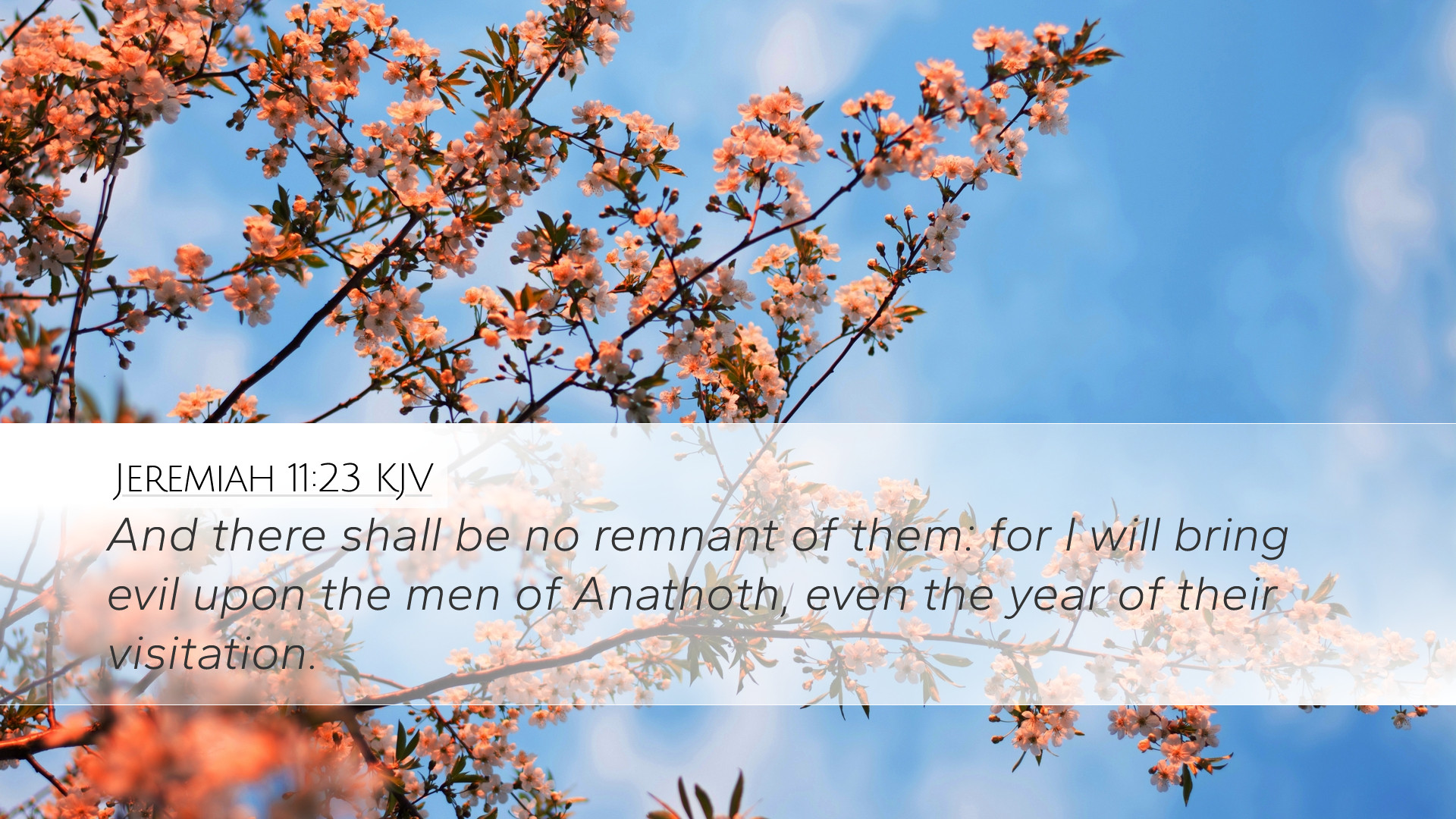Commentary on Jeremiah 11:23
Text of Jeremiah 11:23 (KJV): "And they shall not be a remnant, nor bear any of their blessings, nor be left from their troubles; I will not dare to blush."
Introduction
The verse from Jeremiah 11:23 serves as a stern warning from God through the prophet Jeremiah. This passage occurs within a broader context of covenantal fidelity and the consequences of turning away from divine commandments. As scholars, students, and pastors reflect on this scripture, it is essential to delve into the thematic elements of judgment, hope, and the nature of God’s relationship with His people.
Historical Context
The setting of Jeremiah is crucial for understanding the implications of this verse. Jeremiah prophesied during a turbulent time in Judah’s history, preceding the Babylonian exile. As a prophet, he called the people back to covenant fidelity, highlighting the consequences of their actions upon their relationship with God.
- Judah's Apostasy: The narrative is steeped in Judah's recurring rebellion against God, which ultimately leads to divine judgement.
- Exile and Destruction: The prophecy foretells impending doom and destruction, aimed primarily at illustrating the severity of their unfaithfulness.
Thematic Analysis
This verse encapsulates key themes central to the prophetic literature, such as judgement, the concept of remnant, and divine promise.
- Judgment: Jeremiah’s declaration emphasizes that a true severance from God’s blessings comes as a direct result of disobedience. The assurance of no remnant points to the obliteration of hope for unrepentant hearts.
- The Remnant: The notion of a remnant is vital in prophetic literature, indicative of those who remain faithful. However, this specific warning suggests an imminent loss of even that remnant due to persistent unfaithfulness.
- Divine Sovereignty: The text reveals that God’s sovereignty includes the mercy of allowing a remnant but also the justice of judgment upon the sinful.
Insights from Matthew Henry
Matthew Henry, known for his comprehensive commentary, emphasizes the harsh reality of God’s justice as portrayed in Jeremiah 11:23. He highlights the consequences of national sins and the divine withdrawal of favor.
- God’s Wrath: Henry points out that God's wrath is not arbitrary; it follows the people's sin. His commentary firmly establishes that the absence of the remnant signifies a turning away from grace.
- Covenantal Implications: He notes the rupture of the covenant relationship and warns against complacency within the community of faith, as the blessings of this covenant are closely tied to obedience.
Insights from Albert Barnes
Albert Barnes offers a contextual perspective, interpreting the social and political climates affecting Jeremiah’s messages. His insights reveal the spiritual decline that led to this dire prophecy.
- Righteousness vs. Wickedness: Barnes delineates between the faithful and the wicked, underscoring that those persisting in sin will face fragmentation while the righteous are upheld.
- Historical Consequences: He examines the immediate consequences of failure to repent, connecting it to the historical exile, which serves as a warning for future generations.
Insights from Adam Clarke
Adam Clarke’s commentary elaborates on the language and imagery within the text. His attention to the original Hebrew provides deeper understanding of the terms used in the verse.
- Linguistic Elements: Clarke emphasizes the emotive language of “shall not be a remnant,” stressing the finality and severity of God’s judgment which involved a total loss of blessing.
- Divine Intention: Furthermore, he explores the implications of divine intention in allowing such a judgment, asserting that it reflects both God’s love for righteousness and his intolerance of persistent unfaithfulness.
Lessons for Today
As we reflect on Jeremiah 11:23 in our contemporary context, several significant lessons emerge for pastors, students, and scholars:
- The Call to Holiness: The passage serves as a reminder of the call to holiness, urging the faith community to remain steadfast against the temptations of compromise.
- The Reality of Judgment: It stands as a stark warning about the reality of divine judgment for unrepentant sin, encouraging a return to repentance and faithfulness.
- God’s Faithfulness: Even in judgment, the faithful assurance of God’s character remains; He is just and true, and His desires for His people encompass restoration and redemption.
Conclusion
Jeremiah 11:23 is a powerful reminder of the consequences of disobedience against God, framed within the context of a deep, covenantal relationship. The insights drawn from historical context, theological reflection, and the commentaries of respected scholars provide a multifaceted understanding of this significant verse. In our pursuit of faith and integrity, may we heed its warnings and remind others of God’s continual call to righteousness.


